Rev James (Sevencroft) Blomfield
Not personally connected with Bow, James Blomfield's uncle was Rev George John Blomfield's grandfather.
Seven years older than his cousin Charles James Blomfield (a future Bishop of London), James was born in the village of Woodbridge in Suffolk in 1793. His parents were John, a cabinetmaker, and Sarah (previously Sarah Mann, a widow). He had at least one sister, Mary Anne, two years younger.
He was probably educated at his relatives’ school in Bury St Edmonds. He adopted the middle name of Sevecroft in later years. In 1837, when a teacher at that school, he married Mary Anne Friend, the daughter of a Bury confectioner. Between 1818 and 1821 they had three children, all baptised in Bury, whose baptism records show his occupation as a schoolmaster.
In 1820 he appears to have enrolled at Christ’s College, Cambridge, although was never resident, and he was ordained in Norwich the following year.
In around 1825 he was appointed stipendiary curate in the seaside town of Aldeburgh, Suffolk.
When he left Aldeburgh - in February 1827 - all the contents of Vicarage House where he had lived were auctioned. A month later his wife died at her father’s house in Bury.
Shortly afterwards he sued Mr Tempest a solicitor of the town for libel. Tempest had made various insinuations about his suitability as a clergyman, and his private life. He was awarded £800 damages.
In 1829 their younger daughter Elizabeth died in Paris. James remarried and in 1830 his daughter Mary Sevencroft Blomfield was baptised in Hertford.
That year he set off for a new life in Tasmania. He was already the black sheep in his family but his cousin the Bishop raised £400 for his trip including sheep and farming equipment. However when James Blomfield arrived at Cape Town en route to Australia, he disembarked, sold all his farm stock and for a short while worked as an artist. He then returned to Britain
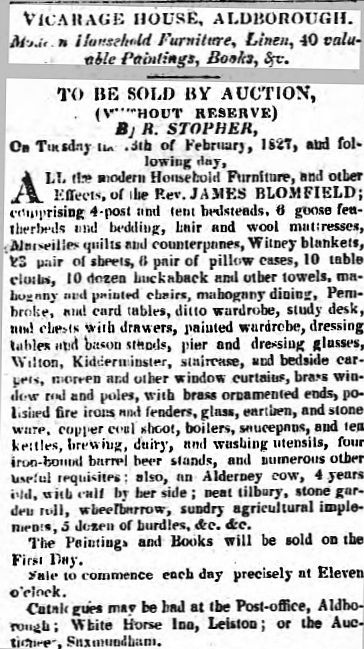
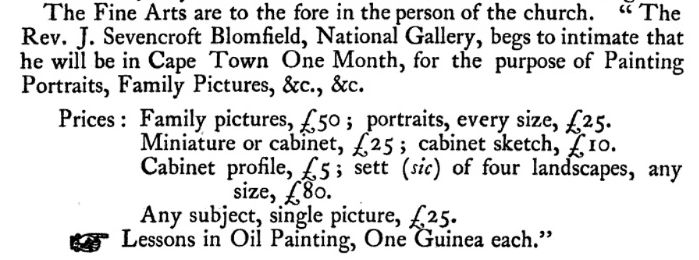
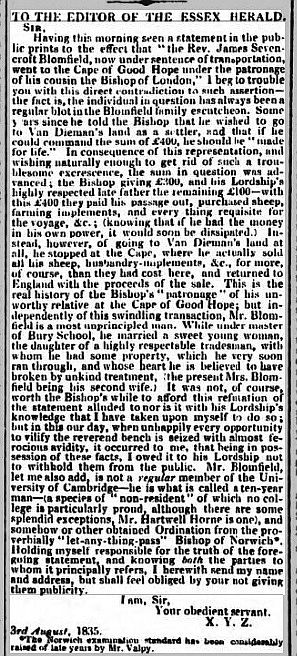
Not much is known about his time in New South Wales. He was assigned to Port Macquarie. In Sydney in 1843, just after receiving his certificate of freedom, he married Eleanor Ann Banks. Their only son, Vernon Sevencroft Blomfield, died one month old in 1844.
In 1835, now 42 years old, he was arrested for stealing a pair of gold-framed spectacles in London. He had been calling from door to door to get subscribers for a proposed book on his experiences in the Cape of Good Hope. He claimed that the spectacles, which he pawned, fell off a table into his hat. At the Old Bailey he was found guilty and sentenced to be transported for seven years. “When Rev. James Blomfield left the dock he seemed quite astounded at his sentence.”
After a short while on the “Hardy” convict hulk moored at Portsmouth, he was taken to Sydney on the “Royal Sovereign” where he arrived in December 1835.
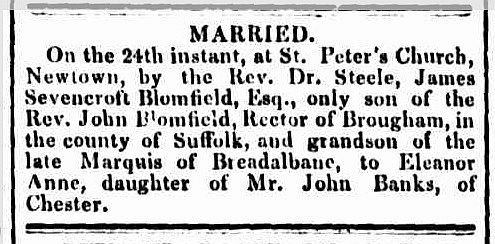
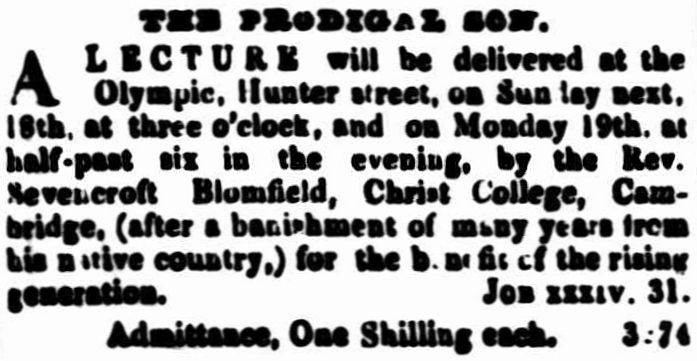
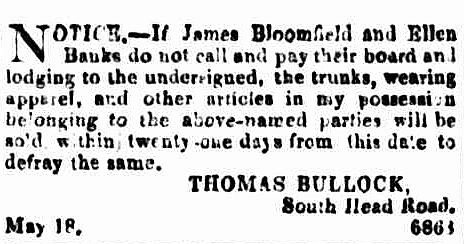

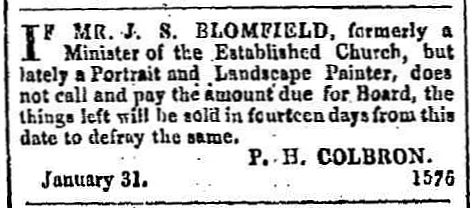
He was unflatteringly described at that time as "Lately free from Port Macquarie. Dresses and apes the clerical in his coat, neckcloth and step. Transported for stealing spectacles. An enormous glutton - ate 1 1/2 lbs of mutton for breakfast. Lived at Kene's with a young woman he called his niece." Registry of the Flashmen, courtesy Jenny Willetts
Somehow he managed to get himself back to Britain where his criminal career continued. In 1845 a booklet ironically entitled “Talent and trial; or, The adventures of a good son”; by the Rev Sevenecroft Bloomfield (sic) was published in London.
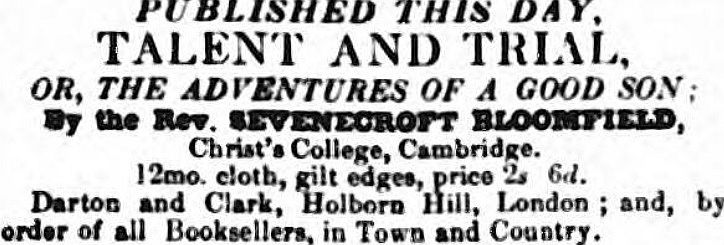
In 1850 he was being tracked as he moved around the country using various aliases.
In 1851 he was arrested in Sheerness, using the name of Robert Collingwood, for obtaining goods –which were pawned - under false pretences. Collingwood declined to say anything, and was sent for trial back at the Old Bailey. There on 24 November in a very short trial he pleaded guilty to unlawfully obtaining a portmanteau, and other articles, value £6. 10s.; the goods of William Allcock and another, by false pretences and was sentenced to be imprisoned for six months. Old Bailey transcript
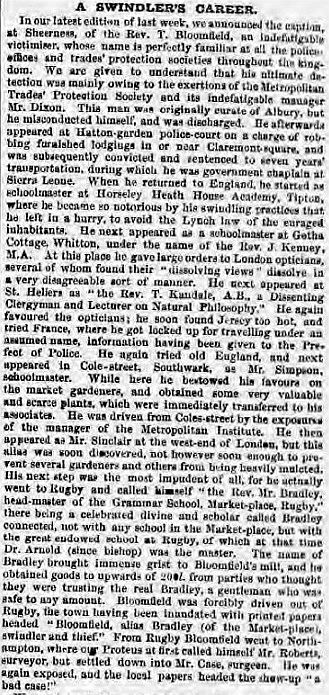
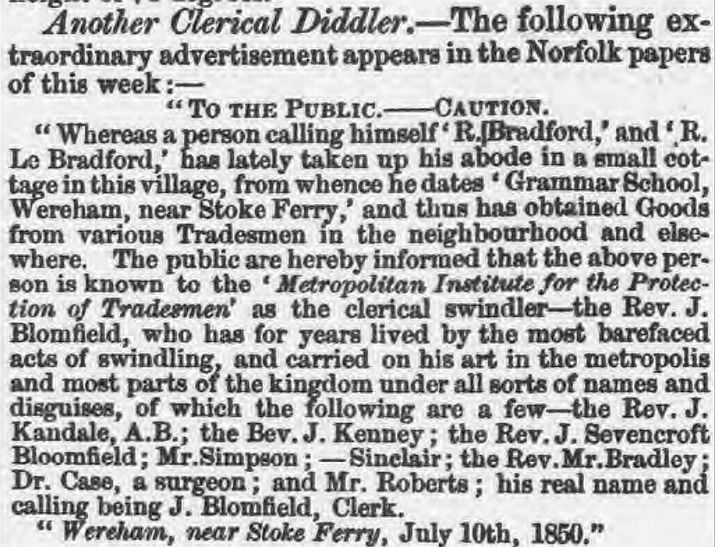
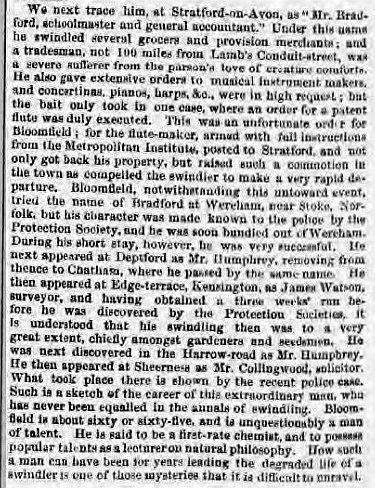
What became of James Blomfield after he was released from prison is unclear: He would have been about 52 years old.
James Blomfield's father-in-law Isaac Friend specifically excluded him from benefiting from his will written in 1824. Friend died in 1832; his widow Susan lived on another 10 years. Her will written in 1838 mentions James and Mary Anne’s two children Henry Sevencroft Blomfield and Mary Ann Blomfield as beneficiaries. Both later married – Marianne to surgeon John Cuthbert Whaley, and Henry Sevencroft to Charlotte Spencer.
